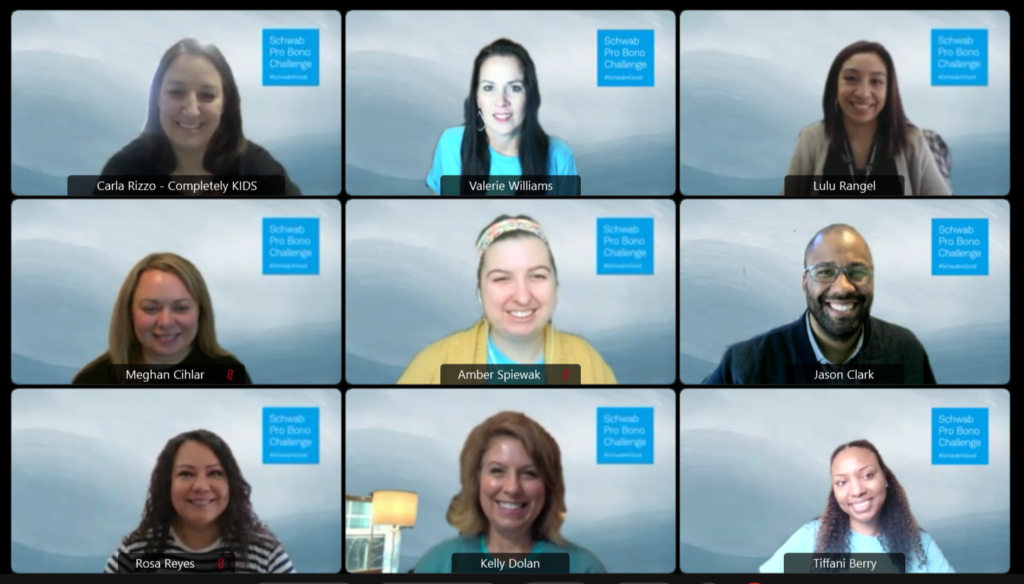Organizations are increasingly stepping up their commitments to diversity, equity, and inclusion (DEI), but defining what that looks like in practice can be difficult, not to mention creating a plan of action and bringing different stakeholder groups into alignment. That was the challenge nonprofit Completely KIDS brought to the Charles Schwab Pro Bono Challenge in partnership with Common Impact. The Omaha-based youth development organization works in partnership with local schools and homeless shelters to empower kids and families to break the cycle of poverty and create a more safe, healthy, successful, and connected community. Completely KIDS is committed to DEI across all facets of the organization. The staff recognized that they needed a formal strategy to enhance their culture of inclusion and equity and be more representative of their constituents, who are mostly Latinx and Black. They established a DEI taskforce a few years ago, although lack of direction and actionable objectives have left them unsure of how to progress past education and internal discussions. Completely KIDS came to the Pro Bono Challenge for support in translating its dedication to DEI into meaningful action in alignment with its mission and community.
The collaboration began with the “discovery session” where a team of Charles Schwab skills-based volunteers met with Completely KIDS’ CEO and two senior staff members to discuss the organization’s mission and programs as well as the challenges the DEI committee has faced in advancing this work thus far. The team determined that Completely KIDS needed a unifying vision, a set of goals and guiding principles, and a plan to bring them to life that takes into account all its core stakeholders: staff, board members, constituents, and the greater community. Together, the Schwabbies and Completely KIDS representatives identified what some of these goals are, including 1) diversifying staff – particularly at the executive level – and the board to ensure they are truly reflective of the community they support and 2) developing a DEI communications strategy for crises and everyday use.
The volunteers then moved onto the “design session” where they worked amongst themselves to create a high-level strategy and timeline for promoting inclusive community engagement and a more diverse, equitable internal culture. A week after the discovery session, the Schwabbies and Completely KIDS staff reunited for “delivery” where the volunteers presented their strategy for optimization based on the nonprofit’s feedback, needs, and capacity. They began by sharing their ideas for a governance structure with defined roles and responsibilities for each core stakeholder group to provide clarity into the work, develop internal and external alignment, and increase engagement and support of the initiative. Next, the Schwabbies introduced their outline for an inclusive talent acquisition and workplace culture strategy that incorporated DEI best practices around hiring, orientation, and employee engagement and retention. To support the creation of a formal DEI communications strategy, the volunteer team offered high-level best practices for establishing a crisis communications team and spokespeople, anticipating realistic scenarios relevant to Completely KIDS’ work and community, and drafting prepared statements. They discussed how to ensure messaging is consistent with Completely KIDS’ overall identity, assessing when to speak out and in what capacity, and not getting stuck in the mindset of only talking about DEI in connection with tragedies, but making a point of celebrating organization milestones and accomplishments within the community too.
The recommendations the Charles Schwab skills-based volunteers provided were exactly what the Completely KIDS team needed to translate their passion into action. CEO Carla Rizzo remarked, “It wasn’t so specific and prescriptive it would miss anything. It was buckets and ways to move things forward. That was incredibly intelligent how you put that together.” She and her colleagues appreciated how intentional their Schwabbies were in not trying to “boil the ocean,” but instead setting up Completely KIDS for manageable, relevant next steps, like their “quick win” recommendations throughout the strategy for building momentum early on. Thanks to the power of skills-based volunteering, Completely KIDS now has the direction and specificity it needs to make real DEI progress within its walls and beyond.




